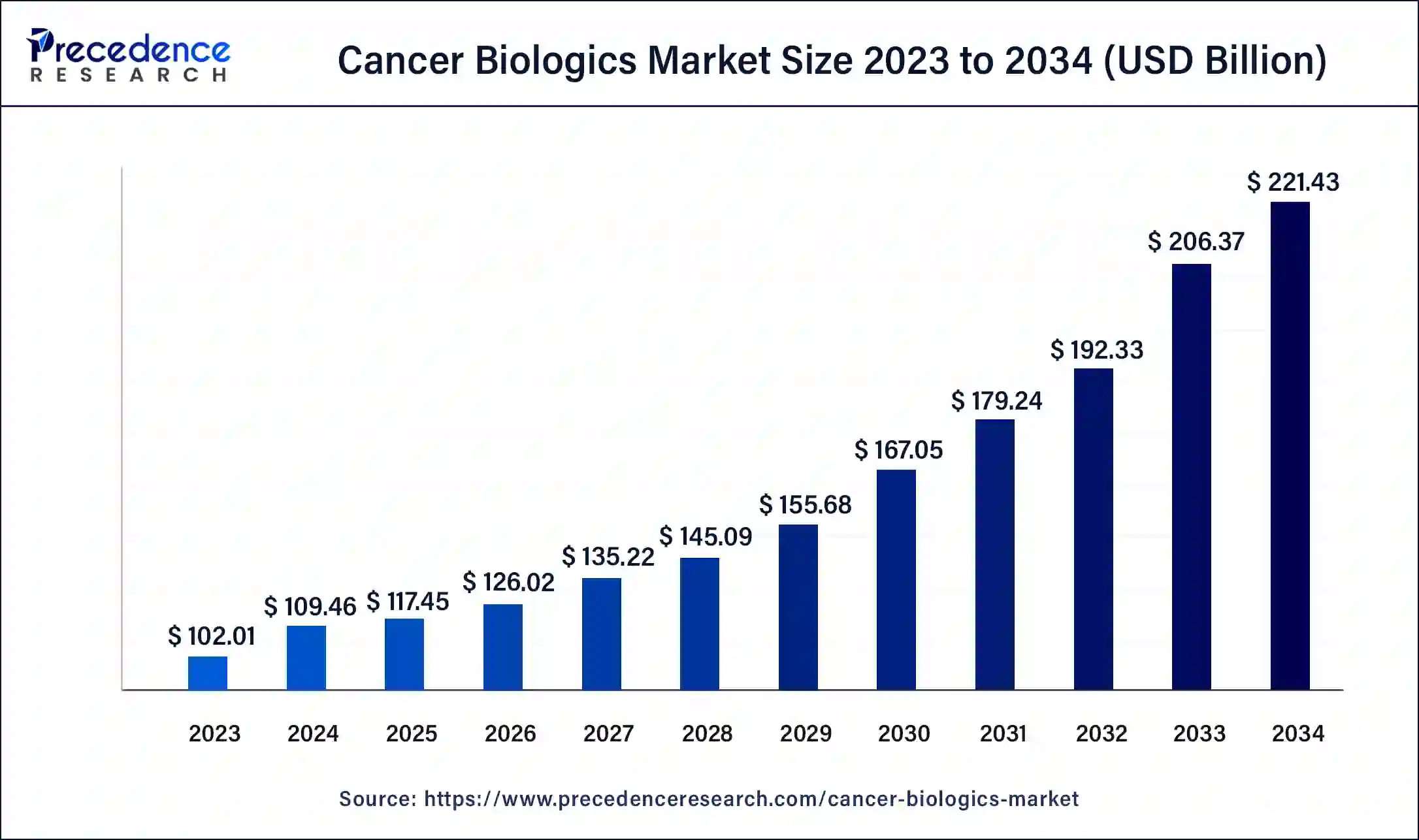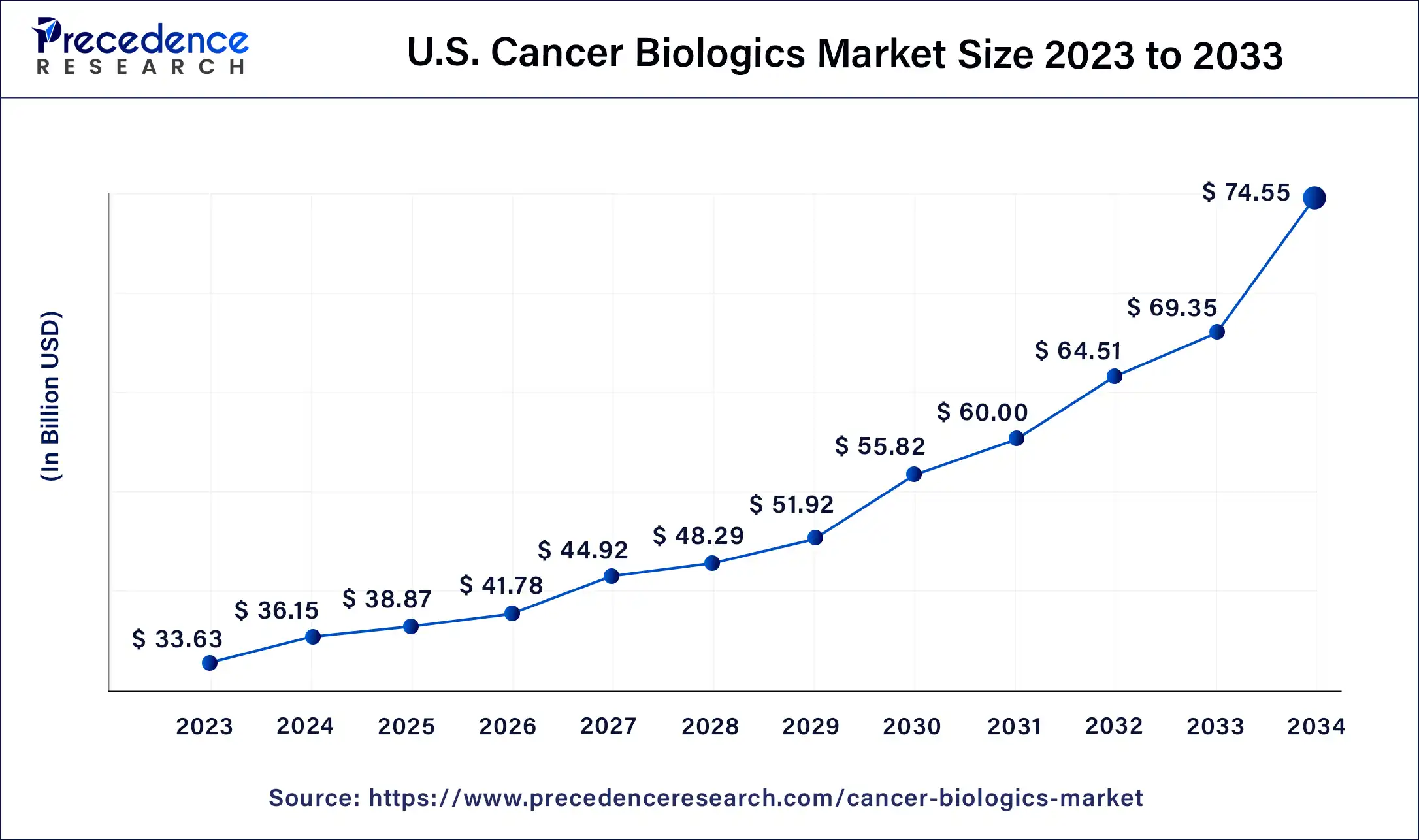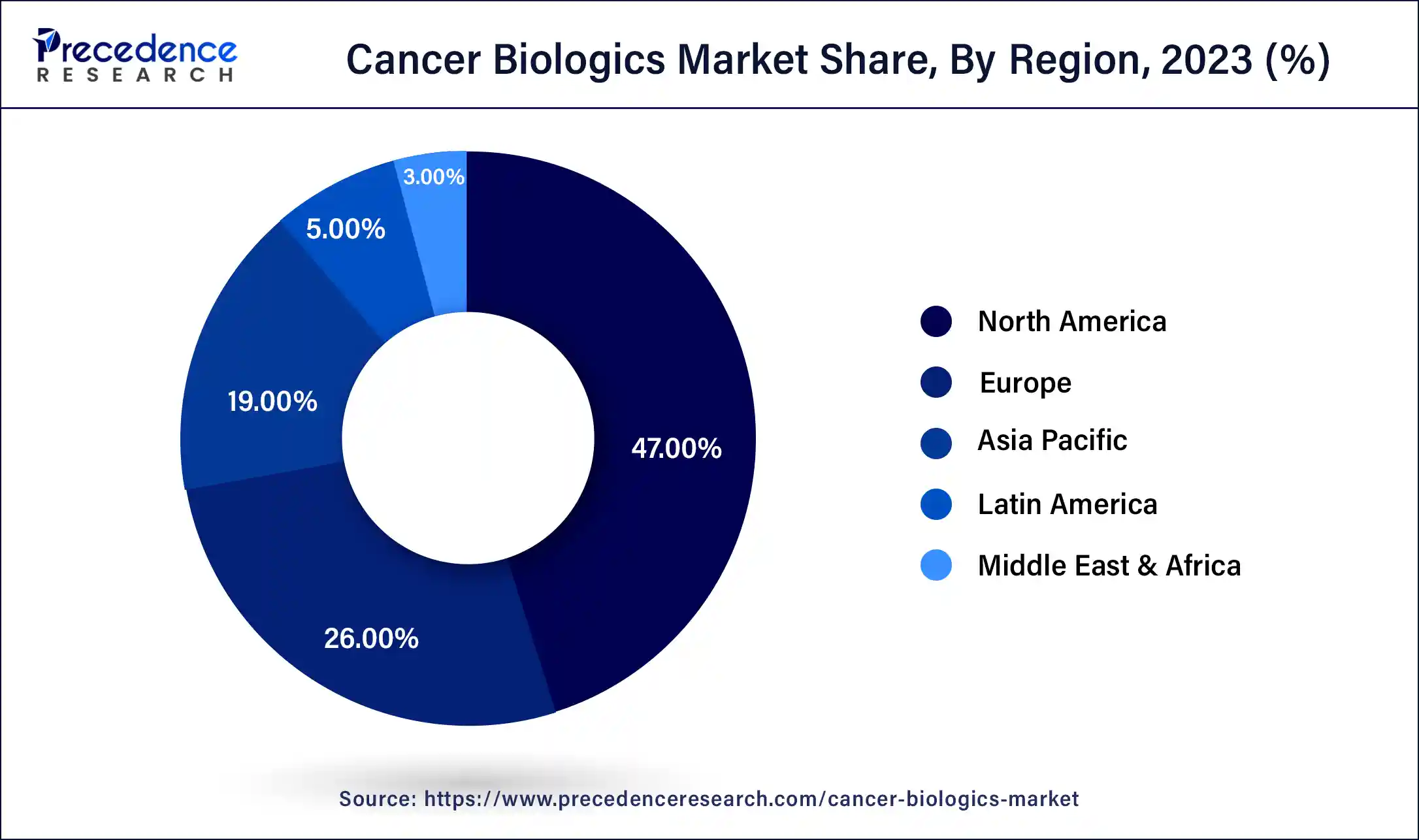Cancer Biologics Market Size and Forecast 2025 to 2034
The global cancer biologics market size was accounted at USD 109.46 billion in 2024, and is expected to reach around USD 221.43 billion by 2034, expanding at a CAGR of 7.30% from 2025 to 2034. The North America cancer biologics market size reached USD 51.45 billion in 2024.

Cancer Biologics Market Key Takeaways
- The global cancer biologics market was valued at USD 109.46 billion in 2024.
- It is projected to reach USD 221.43 billion by 2034.
- The cancer biologics market is expected to grow at a CAGR of 7.30% from 2025 to 2034.
- North America led the global market with the highest market share of 47% in 2024.
- Asia Pacific is expected to grow steadily in the market during the forecast period.
- The monoclonal antibodies segment dominated the market by drug class in 2024.
- The cancer growth inhibitors segment is expected to grow to the highest CAGR in the market by application during the forecast period.
- The blood cancer segment dominated the market by application in 2024.
- The lung cancer segment is expected to grow to the highest CAGR in the market by application during the forecast period.
- In 2024, the hospital segment dominated the market by end use.
- The cancer center segment is expected to grow to the highest CAGR in the market by end-use during the forecast period.
U.S. Cancer Biologics Market Size and Growth 2025 to 2034
The U.S. cancer biologics market size was estimated at USD 36.15 billion in 2024 and is predicted to be worth around USD 74.55 billion by 2034, at a CAGR of 7.51% from 2025 to 2034.

North America led the cancer biologics market in 2024.Geographic variations in cancer rates are assumed to be mostly due to variances in lifestyle factors, such as smoking, which are found to be connected with a considerable fraction of diagnoses in North America. The need for cancer biologics is increased by the rising incidence and prevalence of cancer among North American populations, which has led to a growth in the market for cancer biologics in the region.

Throughout the forecast period, the cancer biologics market by geography is expected to rise gradually in Asia Pacific.The demand for cancer biologics has surged due to the increasing cancer prevalence in the Asia Pacific population, and as a result, the market for cancer biologics is expanding in this region. Owing to the surge in demand for cancer biologics, the major participants in the Asia-Pacific cancer biologics market are Novartis International AG, Pfizer Inc., Roche Holding AG, Merck & Co., Inc., and AstraZeneca plc.
Market Overview
The cancer biologics market refers to the industry that offers drug or medicines used to treat cancer or to prevent cancer, which are derived from biological sources, including living organisms or their components. Typically, biologics are complex large molecules produced through biotechnological processes. The common types of cancer biologics include monoclonal antibodies, cytokines, cancer vaccines, checkpoint inhibitors, targeted therapies, etc.
Biologics also offers targeted and fewer proxy treatment options compared to traditional chemotherapy, which aims to improve the outcomes of cancer patients. The causes of cancers include lifestyle choices, environmental factors, chronic inflammation, hormonal factors, immune system dysfunction, family history, genetic factors, and viral infection.
- The cancer biologics market is fragmented, with multiple small-scale and large-scale players, such as Abbott, Angel, Amgen, Inc., AstraZeneca, BioNTech, Bristol-Mayer Squibb Company, Dr. Reddy's Laboratories, Duality Biologics, Eli Lilly and Company, F.Hoffmann-La Roche Ltd., Gilead Sciences, Inc., Glenmark Pharmaceuticals Ltd., GSK plc., Ichnos Sciences Inc., Johnson & Johnson Services, Inc., Pfizer, Inc, etc.
Cancer Biologics Market Growth Factors
- The increasing incidence of cancer can be the driving factor in the cancer biologics market.
- With the rising number of cancer patients in the cancer biologics market, pharmaceutical companies may invest more resources in research, developing, and commercializing biologics to meet the growing demand for cancer biologics.
- The advancement in biotechnology of cancer biologics can be an opportunity for the cancer biologics market. These advancements in biotechnology include next-generation sequencing, also known as NGS, CRISPER—Cas9 gene editing, and single-cell analysis, which have enabled research to understand the genetic mutation driving cancer and develop biologics for cancer patients.
Market Scope
| Report Coverage | Details |
| Growth Rate from 2025 to 2034 | CAGR of 7.30% |
| Market Size in 2024 | USD 109.46 Billion |
| Market Size in 2025 | USD 117.45 Billion |
| Market Size by 2034 | USD 221.43Billion |
| Largest Market | North America |
| Base Year | 2024 |
| Forecast Period | 2025 to 2034 |
| Segments Covered | By Drug Class, By Applications, and By End-use |
| Regions Covered | North America, Europe, Asia-Pacific, Latin America, and Middle East & Africa |
Market Dynamics
Driver
Rising incidence of cancer
The increasing incidence of cancer can be the driving factor in the cancer biologics market. As the number of cancer patients rises in the cancer biologics market, pharmaceutical companies may invest more resources in research, developing, and commercializing biologics to meet the growing demand for cancer biologics.
- According to the Journal of American Cancer Society, lung cancer remained the leading cause of cancer death, with an estimated 1.8 million deaths (18%), followed by colorectal (9.4%), liver (8.3%), stomach (7.7%), and female breast (6.9%) cancers.
Rising awareness about cancer biologics can be the driving factor in the market. Cancer biologics are drugs or medicines used to treat or prevent cancer derived from biological sources, including living organisms or their components.
Restraint
Risks associated with biologics
The risk associated with biologics can be a restraint to the cancer biologics market. People are more concerned about the health and the side effects of biologics, including allergy reactions and common infections. People who take biologics are more likely to get infections such as pneumonia, upper respiratory infections, urinary tract infections, skin infections, opportunistic infections, and types of infections that are less common in healthy people and more common in people whose immune systems are impaired. Some examples of such opportunistic infections include tuberculosis, hepatitis B, and fungal infections such as histoplasmosis.
Opportunity
Advancement in biotechnology
The advancement in biotechnology of cancer biologics can be an opportunity for the cancer biologics market. The advances in biotechnology include next-generation sequencing, also known as NGS, CRISPER-Cas9 gene editing, and single-cell analysis, which have enabled research to understand the genetic mutation driving cancer and develop biologics for cancer patients.
- In August 2023, TFC Therapeutics announced the launch of advanced novel platforms and technologies in cancer biology. TFC's emerging platform technologies are focused on the elimination of TMH cells, which are found in the bloodstream of patients with cancer.
Drug Class Insights
The monoclonal antibodies segment dominated the cancer biologics market in 2024. The monoclonal antibodies are segmented into conjugated monoclonal antibodies, naked monoclonal antibodies and bispecific monoclonal antibodies. Monoclonal antibodies are a category of proteinious structures made in the laboratory that can bind to certain targeted antigens on the surface of cancer cells. A monoclonal antibody is produced from a cell lineage made by cloning a unique white blood cell. Examples of monoclonal antibodies include trastuzumab (Herceptin) for HER2, which is useful for breast cancer, and rituximab for lymphoma cancer.
The cancer growth inhibitors segment is expected to grow to the highest CAGR in the cancer biologics market by application during the forecast period. The cancer growth inhibitors are segmented into tyrosine kinase inhibitors, mTOR inhibitors, and proteasome inhibitors. Cancer growth inhibitors are drugs that interfere with the growth and proliferation of cancer cells. They work by targeting specific molecules that are crucial for cancer sale survival and replication. These cancer inhibitors can act through various mechanisms, including blocking cell signaling pathways, inhibiting DNA replication, or promoting sale death in cancer cells.
Application Insights
The blood cancer segment dominated the cancer biologics market by application in 2024. Blood cancer is also known as hematological malignancy, which refers to cancers that affect the blood, bone marrow, and lymphatic system. There are different types of blood cancer, including leukemia, lymphoma, and multiple myeloma, each with its own sub-types and characteristics. This cancer typically involves the uncontrolled growth of abnormal cells in the areas disrupting the normal functioning of the blood and immune system; when the growth of cells is completed, then the gland is known as a cancer cell.
The lung cancer segment is projected to grow to the highest CAGR in the cancer biologics market by application during the forecast period. Lung cancer is a cancer that affects the lungs. It is the most common type of cancer, and this cancer is caused by smoking or exposure to secondhand smoke, air pollution, or certain chemicals. There are two types of lung cancer, non-small-cell lung cancer and small-cell lung cancer. Both cancers have different characteristics and treatments.
End-use Insights
The hospitals segment dominated the cancer biologics market by end-user, in 2024. Hospitals always offer oncology department services, which include treatment and ensuring the availability of biologics. Many hospitals are engaged in cancer research and clinical trials for adopting new biologics. Additionally, the hospital provides cancer care services, including surgery, chemotherapy, diagnostics, and biological therapies. Also, the reimbursement policy is often in favor of hospitals providing cancer care services and incentivizing healthcare providers to offer cancer biologics in healthcare settings.
The cancer centers segment is expected to grow to the highest CAGR in the cancer biologics market by end-users during the forecast period. Cancer center offers multidisciplinary care, which involves collaboration among oncologists, researchers, surgeons, and other specialists according to the type of cancer, which provides personalized treatment plans for patients.
Cancer Biologics Market Companies
- Abbott
- Angel
- Amgen, Inc
- AstraZeneca
- BioNTech
- Bristol-Mayer Squibb Company
- Dr. Reddy's Laboratories
- Duality Biologics
- Eli Lilly and Company
- F.Hoffmann-La Roche Ltd.
- Gilead Sciences, Inc.
- Glenmark Pharmaceuticals Ltd
- GSK plc.
- Ichnos Sciences Inc
- Johnson & Johnson Services, Inc
- Pfizer, Inc
- TFC Therapeutics
Recent Developments
- Dr. Reddy's Laboratories declared in March 2024 that Versavo (bevacizumab) would be available in the UK. Avastin's biosimilar Versavo is effective against multiple cancer types, such as advanced non-squamous non-small cell lung cancer, metastatic colorectal cancer, ovarian cancer, recurrent glioblastoma, metastatic renal cell carcinoma, advanced cervical cancer, and metastatic breast cancer.
- BioNTech and Duality Biologics declared in January 2024 that a Phase III trial of a medication for breast cancer has begun. BioNTech and Duality are conducting a Phase III trial to evaluate their antibody-drug conjugate in patients whose tumors have low levels of progesterone or estrogen and respond to these hormones. This corresponds to between 40% and 45% of patients with metastatic breast cancer who are on Herceptin for HER2.
- Angle, a liquid biopsy firm that provides diagnostic solutions for circulating tumor cells (CTCs) in drug development, research, and clinical oncology, announced in November 2023 that the Portrait PD-L1 test would be available for CTCs to assess PD-L1 protein expression.
- In April 2023, TORL BioTherapeutics LLC, a biopharmaceutical company focused on developing new biologics for cancer treatment, announced its public launch and the closing of a $158 million Series B financing.
Segments Covered in the Report
By Drug Class
- Monoclonal Antibodies
- Naked Monoclonal Antibodies
- Conjugated Monoclonal Antibodies
- Bispecific Monoclonal Antibodies
- Cancer Growth Inhibitors
- Tyrosine Kinase Inhibitor
- Mtor Inhibitors
- Proteasome Inhibitors
- Others
- Vaccines
- Preventive Vaccines
- Therapeutic Vaccines
- Recombinants Proteins
- CAR-T Cells
- Angiogenesis Inhibitors
- Interleukins (IL)
- Interferons (IFN)
- Gene Therapy
- Others
By Applications
- Blood Cancer
- Lung Cancer
- Breast Cancer
- Colorectal Cancer
- Prostate Cancer
- Gastric Cancer
- Ovarian Cancer
- Skin Cancer
- Liver Cancer
- Others
By End use
- Hospitals
- Cancer Center
- Academics & Research Institutes
By Geography
- North America
- Europe
- Asia-Pacific
- Latin America
- Middle East and Africa
For inquiries regarding discounts, bulk purchases, or customization requests, please contact us at sales@precedenceresearch.com
Frequently Asked Questions
Ask For Sample
No cookie-cutter, only authentic analysis – take the 1st step to become a Precedence Research client
 Get a Sample
Get a Sample
 Table Of Content
Table Of Content
 sales@precedenceresearch.com
sales@precedenceresearch.com
 +1 804-441-9344
+1 804-441-9344
 Schedule a Meeting
Schedule a Meeting